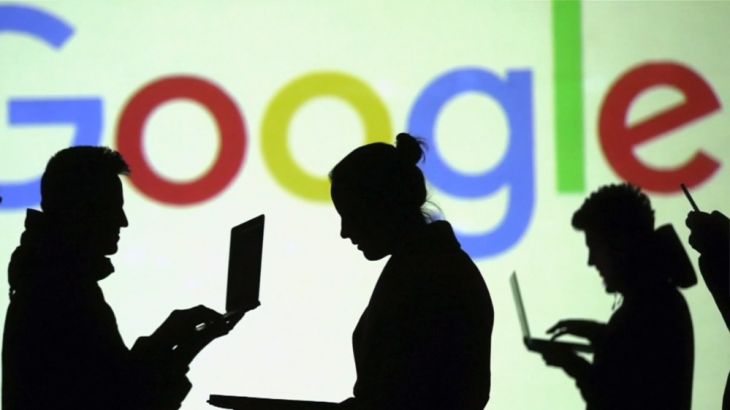
UN investigator David Kaye: Break up Facebook, Google
David Kaye, UN special rapporteur for freedom of expression, on the state of free speech and policing the internet.
Twitter, Facebook, YouTube, among others, are platforms enabling free expression of information and ideas, but they are also increasingly used to spread fake news and hate speech – making serious public policy discussions more difficult and thereby undermining democracies.
What is the state of freedom of speech around the world? Is democracy under threat from all the misinformation and manipulation? And how do you police the internet without censorship and restricting freedom of expression?
Keep reading
list of 4 itemsGeorgia advances ‘foreign agents’ bill as 20,000 rally against it
Lawmakers brawl as Georgian Parliament considers ‘foreign agent’ bill
Journalist loses foot after being badly wounded in Israeli attack in Gaza
David Kaye, the UN special rapporteur for freedom of expression, is an independent expert who is tasked by the UN Human Rights Council to report and monitor on the freedom of expression globally – including on the internet and social media.
“The problem that we see all around the world today is that governments are increasingly interfering with all sorts of human rights, but in terms of my mandate, they are interfering increasingly with everyone’s right to freedom of expression and this is unfortunately a global phenomenon,” he told Al Jazeera.
Since 2014, when Kaye started his role, he has seen the state of freedom of expression going backwards. “We have seen increasing efforts by political leaders, by governments to restrict the kind of robust debate that we expect in democratic societies. We see an increasing concentration of media controlled by the state, it’s been deeply problematic over the last couple of years.”
While the US has traditionally played a role in advocating for freedom of expression, US President Donald Trump may be sending a different message.
“When you have a president who attacks the media on a regular basis, where he calls the media ‘the enemy of the people’ which I think he does for strategic purposes to sow doubt in the people’s opinion about media and in the truthfulness of traditional reporting, I think that’s deeply problematic,” Kaye said, adding, “the rhetoric gives some comfort to authoritarians.”
While Kaye says some societies – like North Korea – are “closed”, others may have journalists targeted for their words. The brutal murder of Saudi journalist Jamal Khashoggi on October 2, 2018, inside the Saudi consulate in Istanbul, Turkey, has led to a demand for accountability and transparency.
US intelligence agencies have concluded that Saudi Crown Prince Mohammed bin Salman, also referred to as MBS, ordered the murder of Khashoggi – a conclusion the Saudi kingdom denies.
Kaye says there is a broader issue of inaction in the face of Khashoggi’s murder.
“There’s been no effort in the UN system by states to seek to censure Saudi Arabia, except in one instance led by Iceland actually in the Human Rights Council. Except for that, in an informal way, there’s been very little censure of Saudi Arabia for its role in the killing of Jamal Khashoggi and I think that is frankly a travesty,” he said.
“All of the threads lead back to the crown prince. He is responsible, I think that seems pretty clear. Whether it amounts to criminal culpability, I think is a question I would really like to see handled by the structures of the UN system.”
The UN determined that the ability to use Facebook was one of the motivators for people to incite violence against the Rohingya in 2016 and 2017.
“Facebook really did not do anything in the face of that incitement of violence even though that was inconsistent with its own rules for participating in the service,” Kaye said.
Facebook acknowledged it wasn’t doing enough to prevent the incitement of violence against the Rohingya community and created additional rules to address the issue, but Kaye noted in many instances it is a real question whether companies are consistently enforcing these rules.
“The major problem here is that we don’t know because they are not transparent about their implementations of their rules.”
Kaye said he thinks this is a time where we should be thinking about government regulation over tech companies to ensure their transparency for users and to keep the platforms safe for human rights. He suggested one possibility of using competition policies like those gaining momentum in the US and tools of anti-trust law to possibly “break up the companies.”
He also pointed out before going down the route of breaking up companies like Facebook, there needs to be a conversation on the global ramifications of such a move.
“We absolutely have to have a conversation about what that kind of break upmight mean for users around the world because remember Facebook, for example, has about two and a half billion users, 85 percent of them are outside the United States. So any kind of tool or regulation that might be adopted here, has to take into account the global users …”
But how do you also police an internet without censorship?
According to Kaye, the internet itself has changed and it is no longer a place where you can discover a whole world of information without any restrictions.
“It was very difficult for governments to impose restrictions. But that internet is gone,” he said. “The internet in the last 15 years has made censorship easier, rather than allow us to reach what we had expected at some level, which might have been a naive expectation of a nirvana of free speech online.”